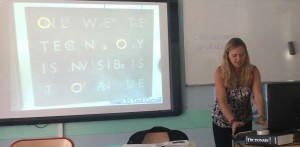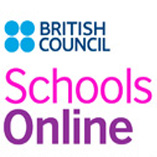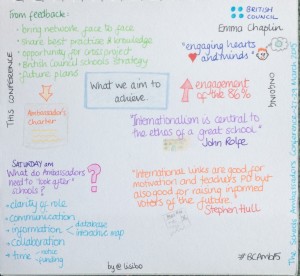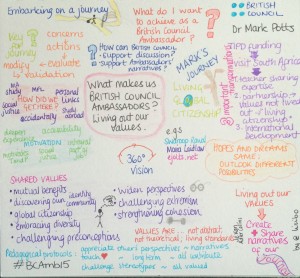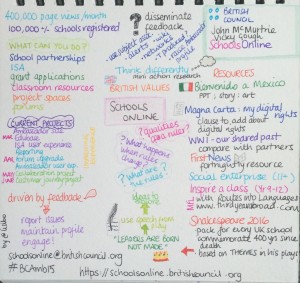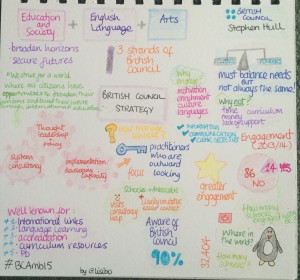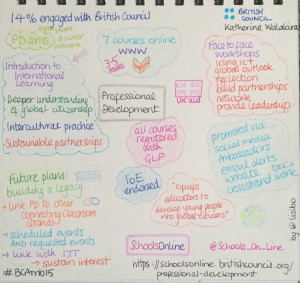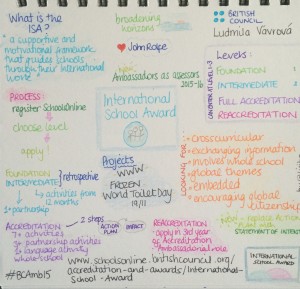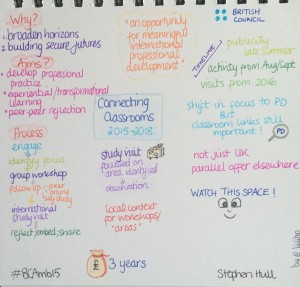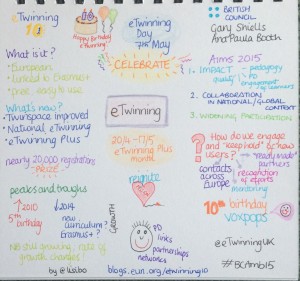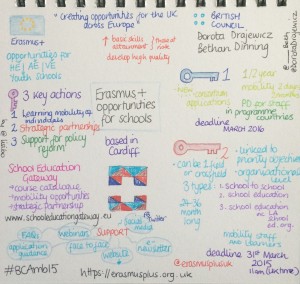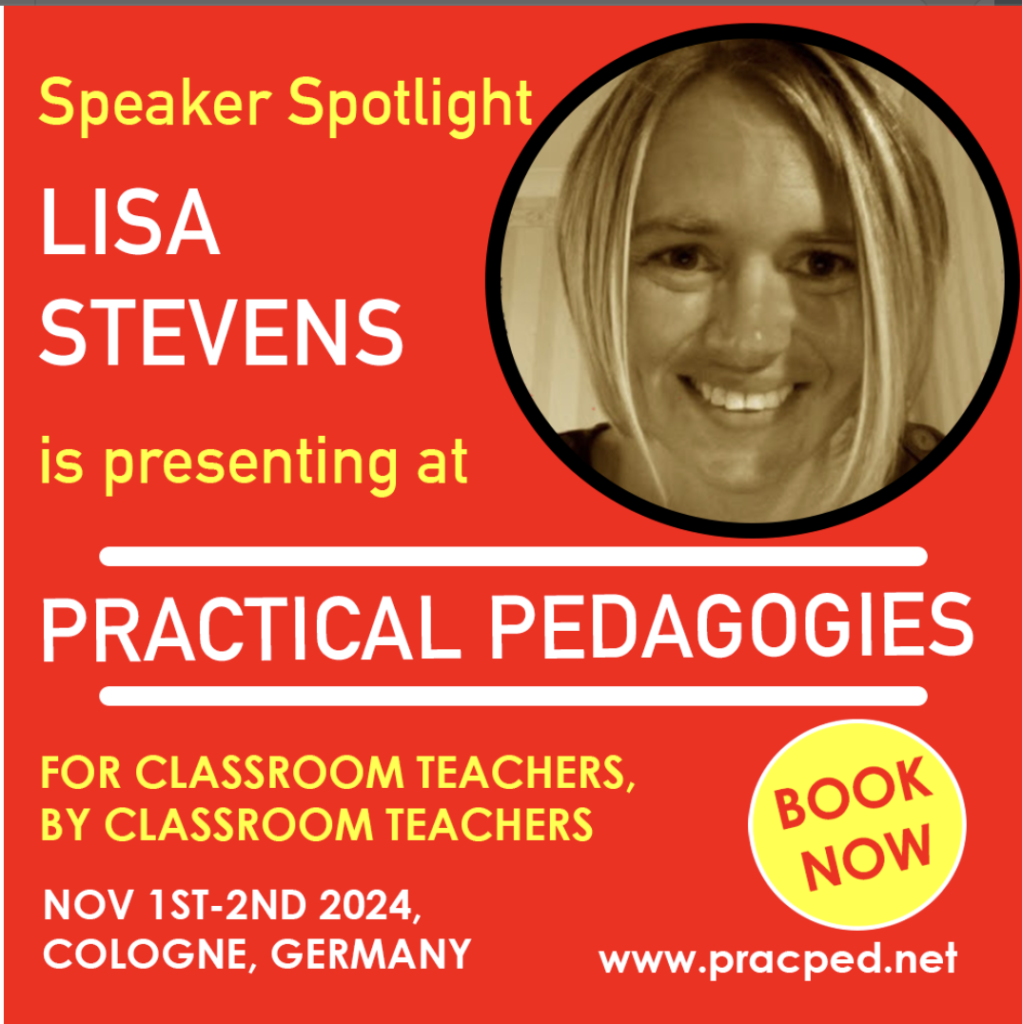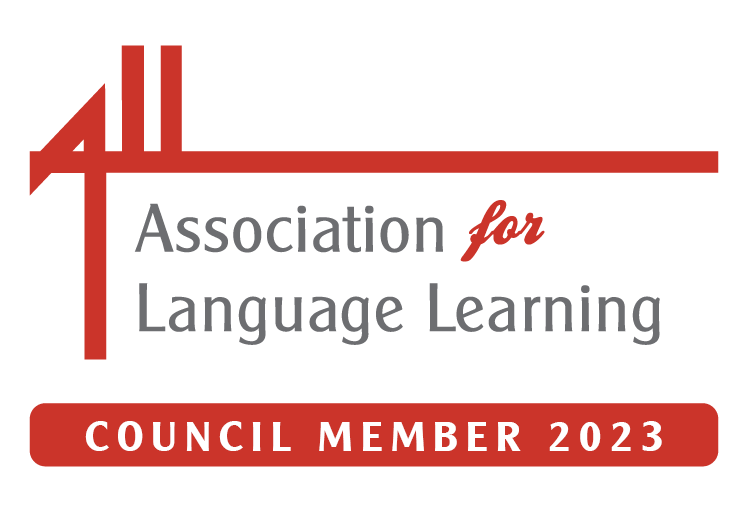

Today I attended The International School Award – Celebration of Excellence at Birmingham’s ICC. Lots of people attending came from schools that had achieved the Full award three times and there were prizes for them this afternoon. One school is unique in having achieved it four times in the 10 year history of the ISA.
There were lots of inspiring speakers, from schools, from management, from national organisations and even from the BBC. Here are some of the thoughts I managed to get down!

David Garner from QCA spoke about the International Dimension in the context of the new curriculum, sharing how it is deeply entwined and embedded into both the secondary and primary context.
He spoke of the challenge to develop the new curriculum- see slide below, and of how the 2020 vision following the Gilbert Review aims to do so. He introduced Naomi Moris, one of the Prime Misister’s Global Fellows who, along with other Fellows, went to China for 6 weeks – 2 weeks looking at cultural aspects of life, 2 weeks spent in a business and 2 weeks in education and completing a project. Her observation was –
of the Prime Misister’s Global Fellows who, along with other Fellows, went to China for 6 weeks – 2 weeks looking at cultural aspects of life, 2 weeks spent in a business and 2 weeks in education and completing a project. Her observation was –
‘
I noted that we were all exactly the same, but whilst we are complacent, they (the Chinese with whom she came into contact) are striving to achieve the best.’
Another observation that David brought to us came from an African teacher on a reciprocal visit, highlighting a difference in priorities –
‘When you came to us, you are an honoured guest. When I visit you, I am a resource’
 We want to develop young people who fit the criteria on the right – how will we do it? David commented on how a project in India impressed visitors who commented that it was resource poor, activity rich – in our country, so often the reverse is true.
We want to develop young people who fit the criteria on the right – how will we do it? David commented on how a project in India impressed visitors who commented that it was resource poor, activity rich – in our country, so often the reverse is true.
 David also shared some new publications from QCA entitled
David also shared some new publications from QCA entitled
- The Global Dimension
- Sustainable Development
- Community Cohesion in action (to follow next year)
John Phillips , Assocaite Head, Hillside High School, Sefton
shared that the ISA is all about children. And demonstrated it by bringing some of the pupils to share their experiences.
‘Working internationally, if it ever was an add on, isn’t anymore. Kids only get one chance at school, and it’s up to us to ‘drip feed’ changes lives. We have opportunities now that 50 years ago weren’t given kids and teachers are empowered now.’
and then developed into their own At Hillside High School, international links started with European Studies project 1986-1992 and developed into their own project – Czech Mates before in 1997 Comenius emerged followed two years later in 1999 by ISA.
One pupil reported on a Performing Arts project involving cookery, dancing, art; another
young lady talked about a poster / banner collaboration between Sefton and Slovakia – using Skype and Adobe Photoshop. A young man talked of an international maths seminar – held in Sefton with several nations represented, solving maths problems together. And Danny Murphy – not the footballer!- reported on radio days, a four hour show that went out over the Internet to many countries – it was lots of work but great fun.
Audr ey Nicholson, International Coordinator at Carlton Digby School
ey Nicholson, International Coordinator at Carlton Digby School
Carlton Digby is a small special school in Nottinghamshire and two of its pupils, Luana and Mia delivered the presentation beautifully with details of their activities such as China Day, raising money for a water pump at a school in Uganda, visits from other countries. ‘We had lots of fun!’ was the phrase that jumped out at me, especially as they taught us a song (see photo) with signs!
Ann Suthern, International Coordinator, Durham Trinity School
Ann talked about the 183 pupils at special school and gave us ideas of projects they had done – touching and feeling ingredients, matching shoes to people and a number of partner schools taking a photo of the view from their window at a set time on a set day – and then comparing and contrasting them
Kevin McCabe, Executive Headteacher, Birmingham City Council
Kevin spoke very charismatically about the profound effect of the International dimension and specifically the ISA on teaching and learning, and how in his experience it has helped improve standards as well as the lives of the kids with whom he was working.
‘The ISA is all about shared experiences between teachers and pupils. It is not given to individuals but to teams of committed people.’
For Kevin, the ISA
has been the encouragement of giving kids things with which to be engaged. The first contact from partner schools inspired an overnight improvement in writing as the careful, neat handwriting of their correspondents led to them taking extra care in an attempt to emulate it. The letters they wrote were not seen as work, and the pupils were motivated by communication with their peers. Kevin left us with a piece of advice he was given before going to India-
‘smell it, live it, eat it and then know that your life will never be the same again.’
Paul Keogh MBE, described by Feargal Keane later in the afternoon as ‘the Peter Kay of language teaching’ is Head of Languages and AST at King James’s, Knaresborough, North Yorkshire. He woke us all up after lunch with braingym in French, the alphabet march and airwriting with hands, noses and bottoms! Very amusing!
He was followed by Maggie Semple OBE, Chief Executive, The Experience Corps Ltd
Maggie talked about how at home as a child she had an international environment (her parents are from British Guyana )but at school not. Education saw people who were different as a deficit – lost to learning.
Maggie related the story of Mrs Jefferys, one of her primary school teachers who tried to make her feel part of the class by using Anansi stories and getting Maggie to read. She;d made assumptins that weren’t correct but her intentions were good. It wouldn’t happen today – teacher wanted to include but went the wrong way about it. Over the years, language and action has evolved.

Her next anecdote came from the opening of the Wallace and Gromit exhibition. As the doors opened, it was the adults who ran through the exhibition not the kids. ADULTS playing – going back to themselves and enjoying playing. Maggie believes that the ISA has enabled us to play again – to do fun things like drawing with our backsides!!
Finally, Maggie talked of how people used to find it hard to get a handle on her- nowadays she is less likely to find comments in playgrounds about differences. She was recently in a museum about to start a PDA search. The kids had done it first and interacted with one another about their learning. Maggie asked a child how to cheat and fnish quickly to which the child said ‘but why would you want to cheat? It’s about learning!’ Through the ISA we’ve allowed kids to be honest about what they do and think.
Really thought provoking!
Feargal Keane, BBC Special Correspondent
 I’d been really looking forward to hearing Feargal Keane speak – and he didn’t disappoint! He started by praising all the schools represented for boosting the moral capital of their schools and for ‘not being in it for the money.’
I’d been really looking forward to hearing Feargal Keane speak – and he didn’t disappoint! He started by praising all the schools represented for boosting the moral capital of their schools and for ‘not being in it for the money.’
He then read a poem, All of these people by Michael Lumley that he had carried around in all warzones that raises the question – who can bring peace to people who are not civilised?
Feargal spoke of an idea of interdependence – of homes, communities and a world where people recognise their dependence on each other not just for money or food, but a mutual dependence where we recognise and see shared humanity and grasp it in every way we can, putting the ideal of that poem into practical effect..
He commented that there is a virus of fear at large in society; news items are full of fear, the
power of media leads to conspiracy theories which kids believe. And if kids are not taught to question orthodoxy and what is in front of them, they won’t be able to take responsible decisions. (At the same time he did acknowledge that this needs to be balanced with need for authority and discipline in schools!) Feargal said that he is worried by negative views of young people in the media, the constant stereotyping of them as yobs as if you tell people enough times, they’ll believe it. He suggested that there is a need for a greater willingness to listen to voice of the young people – what do they have to say? – as he spoke passionately of his experiences in South Africa and of contact with a Cameroon pygmy village.
Feargal Keane is well known for his coverage of the Rwandan genocide, and it is obviously something about which he will always speak with great passion. He pointed out that one reason it happened was b ecause the education system was corrupted- for example, Tutsis made to stand up throughout history lesson whilst Hutus were told that Tutsis were evil. The genocide was described as ‘claustrophobic airless hell’ with a million killed in 100 days.
ecause the education system was corrupted- for example, Tutsis made to stand up throughout history lesson whilst Hutus were told that Tutsis were evil. The genocide was described as ‘claustrophobic airless hell’ with a million killed in 100 days.
Feargal then told us the story of Valentina who hid and survived under bodies of her parents for weeks after the neighbours killed her parents and her brother . She had been severely wounded and was very very ill, but alive – just. Three years later, he went back to find that she had survived. A video was made of the story for the BBC, and that video caused many many schools to contribute to set up a fund for her education. She was sent to High School and two years ago Valentina came to London to speak at genocide memorial day and made a confident speech. She is now at University in USA, speaks fluent english and is doing medical studies to give back to her community.
Feargal’s point was that people who sent that money made all the difference in the world to that child. You can’t change the world on your own but we have a human obligation to make the attempt and reach out to one individual to make a connection. No man is an island – we are all part of the main. Politicians move on becasue another thing cmes along demanding their attention, but we have to keep on at it. As educators, we have a social responsibility – the need to enable kids to make informed decisions – to illustrate this, Feargal gave the example of one of his teachers, Jerome Kelly who gave 2 lessons RE and 3 of philospophy instead of the 5 of RE he was supposed to teach.
Feargal summed up his thoughts by saying
‘People are people because of other people.
We are who we are through our relati
onships and interactions through others.’
I think that is the message I’d like to conclude on, but a small postscript. Following on from this, there was a presentation for schools that had achieved the ISA three times. And one of my abiding memories of the day will the girl from Carlton Digby school ( i think it was Luana!) who, rather than settling for the sedate walk and handshake favoured by others, was so excited that she ran across the platform, launched herself at Feargal Keane and threw her arms around him. And he didn’t seem at all phased! a lovey moment!
 An exciting opportunity for anyone whose primary school teaches Spanish.
An exciting opportunity for anyone whose primary school teaches Spanish.